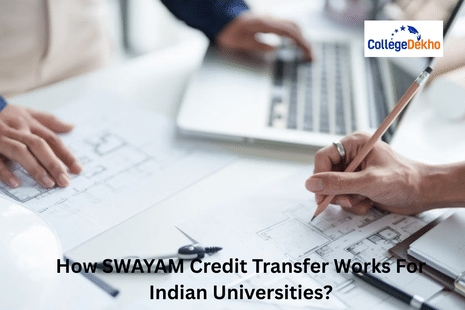SWAYAM credit transfer in India allows students to earn recognised university credits through online courses. Under UGC regulations, up to 20% of degree credits can be completed via SWAYAM, fostering flexible and accessible higher education nationwide.

In recent years, the University Grants Commission (UGC) and the Ministry of Education (MoE) have shown tremendous changes in India’s higher education ecosystem through the SWAYAM Credit Transfer framework. It lets students earn good credit scores for online courses taken on SWAYM and have these credits added toward their usual university degree.
So, what used to be considered as extra learning available on the side now finds itself in the full glare of recognition from esteemed Indian universities. About this SWAYAM intervention, under the UGC (Credit Framework for Online Learning Courses through SWAYAM) Regulation, 2021, regular Indian universities are permitted to give credit to students up to 20 percent of a student’s total degree through SWAYAM courses.
Also Check -
How to Register for SWAYAM exam 2026?
Understanding the SWAYAM Credit Transfer Framework
The Times of India reports that more than 300 universities have adopted this system already, thereby ushering in a nationwide change in systems for awarding academic credits. Knowing well what this framework changes for students and universities is an excellent reframing exercise before analysing the steps toward it.
Introduced by UGC and MoE: The framework allows universities to formally accept credits from SWAYAM courses as part of their regular degree programs.
Course Approval: Transfer of courses can only be done through UGC-approved SWAYAM courses of specified credit points and structured examination.
20% Rule: In SWAYAM courses, students are allowed to complete up to 20 percent of the total number of degree credits required (some universities may allow up to 40 percent).
University Responsibility: Institutions need to embrace the UGC rule and have a Nodal Officer (in charge of verifying and uploading marks.)
Legal Framework: According to ResearchGate, the entire process is governed by the UGC Credit Framework for Online Learning Courses through the SWAYAM Regulation, 2021.
Step-by-Step Process of SWAYAM Credit Transfer
With that framework in mind, the SWAYAM credit transfer process for students studying in Indian universities works in the following manner.
Step 1: Select an Eligible Course
Choose a SWAYAM course approved by your university for credit transfer.
Step 2: Complete Internal Assessments
Submit at least 75 percent of assignments, quizzes, or other in-house work to be eligible to be assessed.
Step 3: Take the End-Term Exam
Exams are conducted by NTA or your own university in case there is a partnership with SWAYAM.
Step 4: Verification by Nodal Officer
After passing, scores are confirmed and uploaded by an official of the university.
Step 5: Transcript Integration
The credits earned are considered and validated by the university, and they in turn count as credits earned in the classroom setting.
Step 6: Follow Credit Limits
Usually, only up to 20% of total degree credits can come from SWAYAM.
Platforms like CollegeDekho guide students in selecting SWAYAM courses that align with their university curriculum, ensuring smooth credit transfer and academic advancement.
Real-World Data and University Adoption
SWAYAM Credit Transfer is more of a revolution happening out there. Here are the numbers that present the scenario of its uptake all over India.
Jammu University Survey : Over 11,670 students (53%) out of 22,000 enrolled learners applied for credit transfer after completing SWAYAM courses.
Massive Enrollment: As per UGC data, 3 crore learners registered on SWAYAM, and 11.3 lakh completed certifications successfully.
Growing Demand: Around 70% of students across Indian universities said they would prefer online SWAYAM courses if they counted toward degree credits.
Institutional Adoption: Top universities like Delhi University, Mumbai University, Anna University, and IGNOU have integrated SWAYAM courses into their curricula.
Benefits of SWAYAM Credit Transfer
The SWAYAM Credit Transfer opens a plethora of opportunities for students, faculty, and universities. It is beyond just a technological change. It's a movement towards accessible and personalised education.
Flexibility: Learn anywhere, anytime, without affecting your degree-granting institution.
Access to Premier Institutions: Earn credits from courses taught by IITs, IIMs, and central universities.
Cost-Effective Learning: All SWAYAM courses are free; only minimal exam fees apply.
Equal Opportunity: Enables students from rural and remote areas to access top-quality education.
Promotes Hybrid Learning: Combines the strengths of digital and traditional classroom education.
Considered more than just a policy, the SWAYAM Credit Transfer system is a revolution in Indian education. With UGC granting online learning the same value as classroom teaching, students now have newly found freedom to learn from the best in India. For the new age learner, it is more than just obtaining credits. It’s about getting credited in a smart and efficient way from anywhere in the country.
Are you feeling lost and unsure about what career path to take after completing 12th standard?
Say goodbye to confusion and hello to a bright future!

Was this article helpful?




















Similar Articles
CBSE Class 10 Previous Year Question Papers 2023 - Download PDFs
UGC NET Passing Marks 2025: Category-wise & Subject-wise
CBSE Class 12 Previous Year Question Papers 2019 - Download PDF
UGC NET Law December 2025 Expected Safe Score for JRF, Assistant Professor, PhD
CBSE Class 10 Previous Year Question Papers 2020 - Download PDF
UGC NET Law Cutoff December 2025 (Expected): Check Category-wise Cutoff for PhD, JRF & Assistant Professor